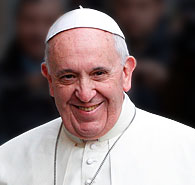How to Smile and Cry Again
During his Wednesday General Audience on March 18, 2015, Pope Francis choose to end his reflection on the different figures of family life – mothers, fathers, children, siblings, and grandparents – by speaking once again on the importance of children. In this audience, he reflected on the great gift that children are to humanity, noting that next week he will speak on wounds that children experience.
Children are a great gift to humanity, the pope said, because they remind us that we all need to be dependent on God. In the first years of life, we are all necessarily dependent on the care of others. This is a state of life that even the Son of God experienced as a baby born from the Virgin Mary. In looking at the experience of Christ, we see how essential it is to depend on others. Often in the Gospels Jesus uses the term “little ones.” “Little” refers to any person who is dependent on the help of another, but most especially children. In this way, God has made Himself understandable both through children and to children. The Manger, Pope Francis said, “is the icon that communicates this reality to us in the simplest and most direct way.”
Another thing the pope said children remind us of is that “we are always children,” despite our age or the varying states of life we may find ourselves in. We are all children because “we did not give life to ourselves,” but rather “we received it.” Pope Francis exclaimed that the first gift we ever received was the gift of life! Yet sometimes we forget that this was a gift, and instead live as though we were self-sufficient or the “masters of our existence.” We need only to be in the presence of a child to remember that we too are also children; “in every age of life, in every situation, in every social condition, we are and remain children.”
Of the many other gifts children bring to humanity, Pope Francis specifically mentioned the way children see reality, with a “trusting and pure look.” Children have natural trust in not only their father and mother, but also God, Jesus and Our Lady.
Children also have an “interior simplicity,” in which they have not yet learned how to act with duplicity. Children are honest; they tell you how they feel and exactly the way they perceive the world to be. In this simplicity they “bear in themselves the capacity of receiving and giving tenderness.” Children carry within themselves a tenderness in which they truly feel things and events. This is evidenced in a child’s spontaneous smile or cry. Adults, the pope said, so often block our ability to smile or cry but children can teach adults how to recover this capacity. Adults must ask themselves these questions: “Do I smile spontaneously with freshness, with love or is my smile artificial? Do I still cry or have I lost the capacity to cry?” Do not be afraid to let a child teach you how to do this again.
A society without children becomes a “sad and grey” society, Pope Francis stated. Yet with the presence of children, despite the trouble they may bring, there is great joy and hope.





